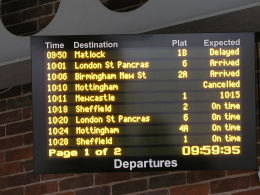Posted 21st February 2019 | 2 Comments
Performance is still falling back

THE punctuality of trains is continuing to worsen, according to new figures released by the Office of Rail and Road. Almost 1 in 20 trains were cancelled or ‘significantly late’ – which means between 30 and 119 minutes behind time at the final destination.
The latest statistics cover the third quarter of 2018-19, October to December. Reliability has also fallen back.
National Punctuality in Quarter 3 was 83.6 per cent, which one percentage point lower than in the same quarter a year earlier.
National Reliability, which measures the number of trains cancelled or significantly late, was 4.5 per cent, which is 0.1 of a percentage point higher than a year earlier. The moving annual average stands at 4.6 per cent, which is an increase of 1.1 percentage points over the year, and is now the highest it has been since the third quarter of 2001-02.
All sectors were affected by the changes, but the ORR has attributed some of the figures to the disruption following the introduction of new timetables in May last year, which particularly affected Govia Thameslink Railway and Northern.
Punctuality in the London and South East sector was down slightly at 85.1 per cent, in the Regional and Scotland sector it was down by 3.2 percentage points to 82.2 per cent, and in the Long Distance sector it was also down, to 78.9 per cent – the lowest Q3 score since 2005-06.
The most punctual operator measured by moving annual averages was Merseyrail, with 95.4 per cent of trains ‘on time’, followed closely by c2c (93.9 per cent), London Overground (93.7 per cent), Chiltern Railways (92.7 per cent) and TfL Rail (92.3 per cent). Also over 90 per cent were Transport for Wales Rail (91.1) and Heathrow Express (90.4).
Operators on the East Coast Main Line tended to trail the field, with Hull Trains scoring just 68.8 per cent, LNER 73.1 per cent, Grand Central 76.9 per cent and Great Northern 78.4 per cent.
TransPennine Express was the only other operator below 80 per cent, at 75.4 per cent.
Labour’s shadow transport secretary Andy McDonald said: ‘These figures are an indictment of the failing privatised railway under Chris Grayling’s stewardship. It is an insult to passengers that fares have soared above wages since 2010 yet the reliability of the railway has gone into decline.
‘Late and cancelled trains harm the economy and damage people’s personal and family lives. We cannot allow this to continue.’
Reader Comments:
Views expressed in submitted comments are that of the author, and not necessarily shared by Railnews.

Chris Neville-Smith, Durham
One bit of good news though: after the December timetable change, the figures for Transpennine and Northern are *way* better. Still a long way to go to get where it should be, but nothing like the farce of the May timetable change.
Now, what do you think the odds are Andy McDonald knows this but chooses to leave that out?
Andrew Gwilt, Benfleet Essex
I use both c2c and Greater Anglia as I live in Benfleet, Essex whenever I do go to London. With Benfleet station being the nearest to me on the London Fenchurch Street-Shoeburyness line and Rayleigh station also the nearest station to me which is on the Southend Victoria Line. But I find that c2c is better, reliable and cheaper to use when travelling to London than travelling on Greater Anglia.